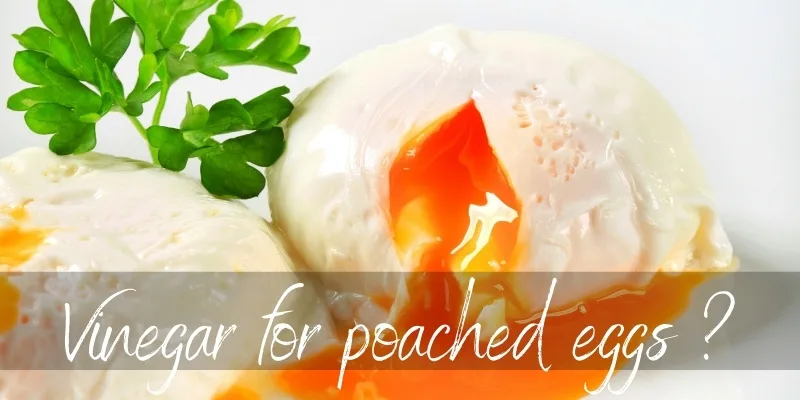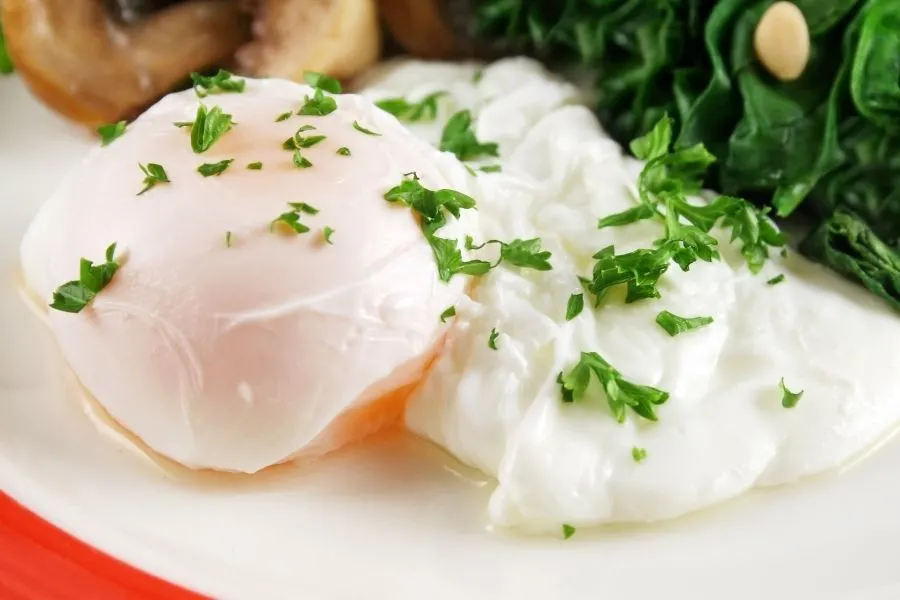Vinegar is very useful around the house, in almost any way you can imagine. It can clear up grime in no time, remove oily stains, add a nice tang to your food, and it makes Easter egg dye stick to the shells.
But why do we add it to poached eggs ? How does it help ? And won’t the poached eggs taste of vinegar ? Can you just skip the vinegar ? How much should you add ?
Poached eggs are difficult enough as it is, so why do they need an extra anxiety-inducing element ? Well, it turns out vinegar has a really important role in poached eggs ! Yup, let’s take a look.

Why add vinegar to poached eggs ?
Vinegar is a mild acid, and it helps denature the protein in the egg whites, making them set and keep their shape much faster and better. Egg whites are made up almost completely of protein (albumin), and the rest is water. There are two ways to make protein harden (or cook), which is to subject it to heat, or to acid.
Both methods change the structure of the protein, making it clump together. The result is firm, opaque egg whites that cook better and hold their shape better.
Do the eggs taste like vinegar ?
Poached eggs don’t end up tasting like vinegar, because you only add abut a tablespoon to the whole pot of water. The added vinegar raises the acidity level of the water, enough to cook the eggs better but not enough to make the eggs sour or vinegary in flavor.
To make poached eggs taste vinegary you have to get a 1:3 vinegar to water ratio, and no one cooks with that.
Read also: Does Balsamic Vinegar Go Bad ?
Can you make poached eggs without vinegar ?
Yes, you can make poached eggs without adding vinegar, but the cook time will be a bit longer and the egg whites will set softer. The upside to adding vinegar is that you don’t need to cook the eggs as long to get a good membrane going, thus the yolk remains runny.
If you poach eggs without vinegar, your yolks have a higher chance of hardening, simply because they’re going to cook longer to allow the albumen to set.
Tips on getting poached eggs right
Poached eggs aren’t exactly easy to get right, but you can follow a few tips to make sure you do your best. These tips aren’t foolproof, but they will help you out a lot. So let’s take a look.
Use a ramekin or small bowl
Crack your egg into a ramekin, and slip it gently into the simmering water from the ramekin. If you do it this way, you can easily fish out any stray bits of eggshell. And you can also make sure the yolk does not break or separate from the whites as it enters the water.
Be sure to add the egg from a very short distance, gently. If cooking a single egg, stir the pot first to make a whirlpool. This will make the egg whites wrap around themselves and you will end up with a mostly spherical egg.

Add a bit of vinegar to the water
Add some vinegar to the poached egg water to make the whites set faster and hold their shape better. You can poach eggs without vinegar, but you will have to cook them longer, in order to cook the egg whites.
Swap the vinegar for lemon juice
If you really dislike the idea of vinegar, you can use another mild acid instead, such as lemon juice. Lemon juice is just as effective as vinegar, but not as readily available. Still, there’s nothing stopping you from juicing a lemon and adding a tablespoon to the poaching water.
This doesn’t work with just any citrus, because they’re not as acidic as lemon. Limes may come close, but they’re very expensive and it’d be a waste to use them like this.
Strain the runny whites through a sieve
Getting poached eggs to wrap around themselves is an art. And it gets very difficult to do so if cooking more than one egg at a time. And if you cook them one after the other, the first egg cools down by the time the second is ready. So, you will have to remove the watery egg white part.
You can do this by straining the eggs through a mesh or metal sieve. The result is that the rest of the egg white, the thicker part, will still cover most of the yolk, and keep it within. Your eggs will end up smaller, true, but they will have a much better shape and hold together better.
Read Also:How To Know When Scrambled Eggs Are Done
Don’t use eggs straight from the fridge
The eggs have to heat up as they’re cooking. The more colder they are, the longer you have to cook them, and the greater the difference between the middle and the outer layer.
So take out the eggs and leave them on the counter about half an hour before you poach them. Make sure the eggs are safe, laying on something that won’t allow them to roll off and break.
And that’s pretty much it about poached eggs and vinegar. Getting the egg whites to set properly calls for a bit of vinegar or lemon juice, so add a tablespoon of these when making poached eggs. You won’t be disappointed, nor will the eggs taste like vinegar.

